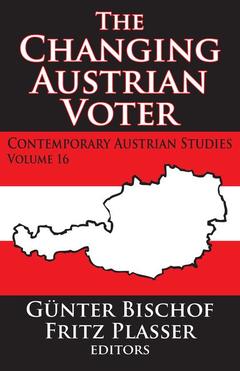Description
The Changing Austrian Voter
Contemporary Austrian studies, vol. 16
Contemporary Austrian Studies Series
Author: Plasser Fritz
Language: English
Subject for The Changing Austrian Voter:
Keywords
Contemporary Austrian Studies; Alexander Lassner; Austrian Voting Behavior; Anton Pelinka; Heinz Christian Strache; Christoph Hofinger; Archiv Der Republik; Eva Zeglovits; Alfred Gusenbauer; Fritz Plasser; Gilg Seeber; Grand Coalition Government; GNter Bischof; Gerald Steinacher; GNther Lengauer; Blue Collar Vote; GNther Ogris; IFES; Herbert Dachs; Grand Coalition; Imma Palme; MBFR Talk; Kurt Richard Luther; West Germany; Manfred Prisching; Bruno Kreisky; Matthew Paul Berg; Austrian Pact; Oliver Rathkolb; Tv Debate; Peter A; Ulram; Gender Specific Differences; Peter Berger; Freiheitliche Partei Osterreichs; Peter Gerlich; Austrian Political System; Peter Ruggenthaler; Foreign Minister; Rudolf Bretschneider; State Secretaries; Thomas Fischer; Voting Behavior; Thomas Nowotny; Orf
Publication date: 04-2008
Support: Print on demand
Publication date: 09-2017
· 15.2x22.9 cm · Hardback
Description
/li>Contents
/li>Biography
/li>
Compared to the late 1970s, when the Austrian voting behavior was characterized by extraordinary stability, low electoral volatility, and high turnout rates, the 1980s and 1990s stand for exceptional changes and ruptures elicited primarily by the rise of the right wing populist FPi (Freedom Party of Austria). This volume of collected papers investigates the permanent changes of Austrian voting behavior over the past forty years and analyzes causes and consequences for party competition and the electoral process in Austria during the first decade of the twenty-first century.
Some of the contributions include Oliver Rathkolb's wide-ranging historical typology which addresses the Austrian voters in the twentieth century from the perspective of expanding voting laws and the struggle for political participation and integration. Based on compact trend data of Austrian Election Studies, Fritz Plasser and Peter A. Ulram present an empirical overview of trends and patterns in Austrian voting behavior covering the period from 1970 to 2006. Both the rising electoral volatility and the permanent increase of constant non-voters since the 1980s are dealt with. The development and dynamics of regional elections in Austria since the mid-1980s are reconstructed and related to the electoral behavior on the federal level.
Kurt Richard Luther analyzes electoral strategies and the rise and fall of Austrian right wing populism from 1986 to 2006, focusing in particular upon changing styles of electoral mobilization. The media's role in framing the Austrian campaign discourse and the specific characteristics of campaign coverage in Austria are also in focus. This well-conceived volume also contains review essays, book reviews, and the annual review of Austrian politics. A mandatory selection for the bookshelves of all those interested in Austria or European Studies, this book provides invaluable information regarding the electoral process in Austria.
INTRODUCTION
TOPICAL ESSAYS
Oliver Rathkolb, The Austrian Voter in Historical Perspective
Fritz Plasser and Peter A. Ulram, Electoral Change in Austria
Christoph Hofinger, Gunther Ogris, and Eva Zeglovits,
It Ain't Over 'til It's Over: Electoral Volatility in Austria
from the 1970s through 2006
Herbert Dachs, Regional Elections in Austria from 1986 to 2006
Kurt Richard Luther, Electoral Strategies and Performance
of Austrian Right-Wing Populism, 1986-2006
Gunther Lengauer, Framing Campaigns: The Media
and Austrian Elections
Fritz Plasser and Gilg Seeber, Austrian Electoral Behavior
in International Comparison
FORUM
Austrian Experts Interpret the National Elections
of October 1, 2006
Rudolf Bretschneider, Political Discontent, Negative
Campaigning and an Overrated Monster: A Short
Comment on the Austrian Parliamentary Elections of 2006
Peter Gerlich, Europeanization in Disguise
The Changing Austrian Voter
Imma Palme, Did the o;VP Lose, or Did the SPo; Win the
2006 National Parliamentary Election?
Anton Pelinka, Who Is the Winner?: The Strategic
Dilemma of "the People's Choice"
Manfred Prisching, The Conservative Turn to Socialism
NON-TOPICAL ESSAYS
Peter Ruggenthaler, A New Perspective from Moscow
Archives: Austria and the Stalin Notes of
Thomas Fischer, The Birth of the N+NA: Austrian
and Swiss Foreign Policy in the CSCE
REVIEW ESSAYS
Matthew Paul Berg, Refocusing the Critical Gaze from
Sixty Years' Distance: Austrians' Experiences of the Nazi
Past in Recent Historical Studies
Peter Berger, Gyo;rgy's Machine Gun, Ildikos New Car:
The Controversial Hungarian Revolution of 1956 Revisited
Alexander Lassner, New Scholarship on Austria, Germany,
and Italy in the International Area during the 1930s
BOOK REVIEWS
Thomas Nowotny: Michael Gehler, o;sterreichs Aussenpolitik
der Zweiten Republik � von der alliierten Besatzung
bis zum Europa des 21. Jahrhunderts
Gunter Bischof: Fritz Fellner and Doris A. Corradini, eds.,
o;sterreichische Geschichtswissenschaft im 20. Jahrhundert:
Ein biographisch-bibliographisches Lexikon
ANNUAL REVIEW
Reinhold Gartner, Austria 2006
LIST OF AUTHORS
These books may interest you

Austria in the European Union 144.74 €



